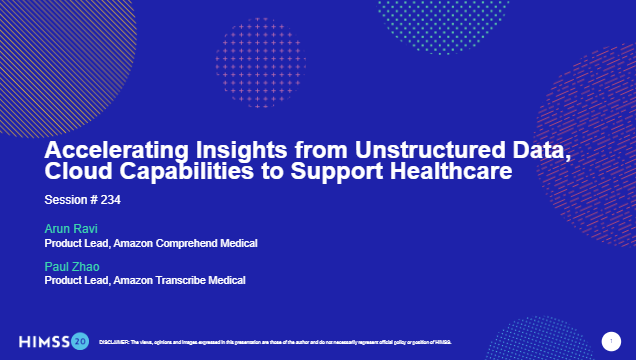Machine Learning: Giving RCM Workers Superpowers?
- Unstructured healthcare data remain an important source of insights to support clinical and operational excellence
- Machine Learning gives healthcare workers "superpowers" to process paper documents and data at super human levels
- Insights from AWS at HIMSS20 Digital Conference
According to Health IT News:
Unstructured healthcare data, within clinical documents and summaries, continues to remain an important source of insights to support clinical and operational excellence.
But there are countless nuggets of important unstructured data – something that does not lend itself to manual search and manipulation by clinicians. This is where automation comes in.
Healthcare continues to be fraught with paper documents which contain important and essential information. However, to extract this data manually is a task that is burdensome and would take a superhuman effort to complete with no errors.
That's where integrating Machine Learning technologies plays a huge role in granting healthcare workers and RCM servicers "superpowers" to complete these tasks at a superhuman efficiency level. While we admit that this superpower isn't what we imagined as kids and there is no cool origin story like being bitten by a radioactive spider, the value to healthcare is just as important.

Photo by Porapak Apichodilok from Pexels.
At the Accelerating Insights from Unstructured Data, Cloud Capabilities to Support Healthcare session at HIMSS20 Digital Conference, Arun Ravi & Paul Zhao, senior product leaders at Amazon Web Services, provided viewers with valuable insights on unstructured healthcare data and machine learning.
Machine learning has this really interesting role to play where we’re not necessarily looking to replace the workflows, but give essentially a superpower to people in healthcare and allow them to do their jobs a lot more efficiently.
If you look at the amount of unstructured data that is created, it is increasing exponentially. And a lot of that remains untapped. There are 1.2 billion unstructured clinical documents that are actually created every year. How do you extract the insights that are valuable for your application without applying manual approaches to it?

Click the image above to register for this complimentary session.
To understand the value of Machine Learning for RCM, it is important for healthcare organizations and RCM servicers to understand how they currently process paper remittances/EOBs and correspondence letters. In many cases, these processes are relying heavily on manual data entry in which Machine Learning technologies have the capabilities to electronify these documents with fewer errors. Electronification of these documents can then be imported into their systems to streamline the payments process and also be utilized for business intelligence.